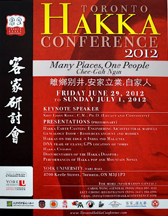In the very short time given to me to address an extremely complex issue from antiquity onto the future, I would like to pronounce a few facts, and settle them once for all.
Historians have been tardy writing on these issues over the centuries, for academic convenience. And researchers have been repeating the same findings, wasting efforts, money, and ink.
WHAT and WHO and WHY and WHERE and WHEN are Hakka’s born and prolonged? I could give my answers if I have hours and days. I now have to be fast and short. So I must be brief.
You can see I have no sheets of prepared speech to read.
I always find inspiration and dynamic thoughts watching my audience. What I say will then have credence and hearty responses that go deep into our common consciousness.
What I see in front of me is a very tall Chancellor of Ryerson University and a short, quiet, Chancellor Emeritus of the U of T. They are both Hakka’s.
I also see heads with dense curry hairs sitting next to heads with artificial curls of natural straight hair. These folks are equally healthy in body and mind, their bank accounts loaded with multiple entries. They are all Hakka’s.
What else could I see? You can look around and tell me.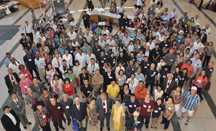
For one thing, the 300 of you come from many regions and countries. Your parents and grandparents all went there from China at different times thru centuries. It took courage and ingenuity, and diligence, honesty, perseverance, propriety, foresight, royalty to ancestors, and creativity. It also meant adaptability with sharp observation and the seizing of opportunities as they emerge, to fit and prosper. On top of these, they have a keenness to learn and humility to foster harmony with other different peoples and cultures in new environments, often assuming leading roles.
These characteristics are all reflected in you. Each and every one of you is a Hakka history.
I hope one day your many stories will be written and put together to constitute a true, whole, and live Hakka history. It will then replace and correct the erroneous claims those historians had made of a simple, lifeless write up in stale books.
Hakka is the Hakka spirit, a viable spirit which has carried our people forward for hundreds of years in China and parts of the world, which will carry us forward into a larger world in future.
Humbleness and frugality are two important elements in the Hakka spirit.
Humbleness means not only confidence in oneself. It is also a care for others, to allow an open attitude toward people and things. It is a basic attitude to learn and achieve. Frugality means, in today’s terms, conservation and saving, environmental protection, if you will. It is a respect for material and people, developing both for a better and continuing future.
Respecting what there is, respecting what needs to be done, respecting a mastery of doing something, respecting the joy of achievement…. These are simple attitudes in life, central to the Hakka spirit.
I remember one Sunday morning some 20 years ago. Keith Lowe and I were shopping at the St. Lawrence Market. We were downstairs at this place which sold beans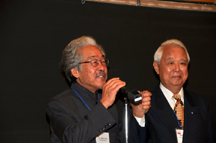 and nuts. He bought half a pound of kidney beans and I half a pound of lentils. The seller was busy so he handed us two small paper bags. Keith put in the goods and the seller put them on the scale one after the other. He looked up astonished. “How did you do that, they are exactly half pounds” he asked.
and nuts. He bought half a pound of kidney beans and I half a pound of lentils. The seller was busy so he handed us two small paper bags. Keith put in the goods and the seller put them on the scale one after the other. He looked up astonished. “How did you do that, they are exactly half pounds” he asked.
Keith simply said: “It shows you that one is not for nothing being the son of a grocer.”
I was impressed. I pictured this little boy who was helping his father in the grocery day in day out, enjoying and respecting what he was doing, and perfecting his understanding and grasp of the nature of beans relative to their weight, and gradually found that he was as exact as the weighing scale in ascertaining the measures.
He went to Harvard later and then to Stanford to complete his Ph.D. degree.
He had told me before that his father was very proud of him. But, in the incident before me, he was expressing pride in his mastery of the trade in being a grocer, a humble trade. He is a Hakka.
I am not going to say that doing a grocer’s job is positively related in achieving academic excellence at the two top universities in America. I am not saying that there is no relationship either.
The wisdom in the Hakka spirit is contained in two simple Chinese words: 耕讀, meaning till and read. In today’s urban terms, they mean to do what is practical and, as well, to learn academic knowledge to the highest degree.
In every Tolou (土樓) or Hakka dwelling in China, as elsewhere abroad, you see couplets on the two sides of walls and windows, mostly written in fine calligraphy. They are two-line poems expressing wishes or gratitude to the universe. Often, you will see these two words leading the lines, or being a part of them. It is this prominence of the basic belief in the Hakka spirit that has encouraged the Hakka people, young and old, to be practical and, at the same time, to aim high in life.
Do not underestimate this basic spirit.
Today, for many children growing up, there is a prevailing attitude to look down on doing practical things, such as cleaning and cooking and keeping things tidy and neat.
Parallel to this attitude is an emphasis on the value of doing school work, often as an easy escape for doing anything at all. The result is obvious to all of us, namely, nothing except laziness and emptiness bound by continuous complaints.
That was not a part of life of that little Hakka boy in Jamaica who grew up in prominence. We also see later today, how our awardees are reflecting the Hakka spirit of being down to earth in life, and arising to heights as a result.
Am I straying? I see the sign for me to end my speech.
But I have not touched the main theme yet. What a shame.
Let me sum up, because I believe I have given you enough example of what is Hakka. James Michener did a more thorough and interesting job in his novel Hawaii. He narrated the leadership and tills of this Hakka woman, Yuzhen, who practically made Hawaii and Hawaiians what they are today, turning the soil into a thriving industry in sugar and pineapple production.
My friend Han Suyin did a more elaborate job.
She wrote eight novels about herself growing up in Henan as a Eurasian, graduating from a famous university in Beijing, doing a secretary’s job to put herself through medical school in London, and on to practising medicine and writing great novels. She was a close friend of Mao, Zhou Enlai, Chin Yi and other prominent revolutionaries. She tracked through the path of the Long March and studied the minority peoples on the way. She has become an expert of the PRC from extensive experience. Then, she is now a world citizen living in Switzerland.
Please do not tell me that my time is up and that I am off my topic.
Let me sum up for sure.
The ancient history of China is a saga in which native Chinese, later called the Han race, was continuously attacked and driven down from the north to the south, by barbarians. They are the Huns, Turks, Khitans, Jerzhens, Mongols, Manchu’s etc. The Great Wall was built to keep them out. But they kept invading. The wall became longer and higher, covering China horizontally, from the highland in the west to the sea in the east.
Ancient wars were fought for a single purpose. It was to seize children and women so the invading tribe would become larger and richer. Only people today are so stupid as to kill for ideology or politics, useless entities, and in the name of God to boot.
Thus, wars meant genetic mixing, and moving to new territories to meet and mix with indigenous peoples. This happened through thousands of years.
We might say at this point, that the giant chancellor on the right of the front row here has the genes of meat-eating Huns and Turks and Mongols, while the short chancellor on the left here has the genes of the vegetarian minority tribes in the mountainous areas. The fact is that even when academic historians say that you and I are Hans, descendents of Huangdi (Yellow Emperor), none of us is a purebred. Instead, we are mix bloods, and we should be proud of it.
Today, we mix even more widely, and well.
I was eight years old when I was brought back to Hakka country from Japanese occupied Hong Kong. Before then, I had never seen a black person. Then, I found in.jpg) my school, a dozen or more blacks, some tall and grand, others short and agile like my friend Roger. We loved him and pronounced his name fondly with sounds of “dirty chap” in Chinese words. Decades later, when I visited my brother in Kingston, Jamaica, I saw his picture hung on the wall of Jigontang (Chinese Masons) as President. There were nine pictures, and six of them were blacks.
my school, a dozen or more blacks, some tall and grand, others short and agile like my friend Roger. We loved him and pronounced his name fondly with sounds of “dirty chap” in Chinese words. Decades later, when I visited my brother in Kingston, Jamaica, I saw his picture hung on the wall of Jigontang (Chinese Masons) as President. There were nine pictures, and six of them were blacks.
The fact is that Hakka’s are opportunists who care for people, any people. Some of my relatives had adopted black kids and brought them to China to give them education and wife and the Chinese culture. They became Hakka.
Regrettably, academic historians do not tell you this. They like to keep Hans pure bred and say how good and noble they are. You should know better now.
It is the Chinese culture that is good, deep, encompassing, embracing, lasting, rich, and wise. I do not know for sure. But it is so powerful that, even when approximately half of the dynasties in 5000 years were ruled by non-Hans, the Hans today constitute the largest number of China’s population. What is more interesting and strange, is that we see no Huns and Tucks and Manchu in China any more. They had integrated in race, culture, language and spirit. They have become Chinese.
So, who and what are Hakka’s?
Hakka’s are members of the Han people, with very diverse genes.
Hakka’s are the most royal preservers and developers of the Chinese culture, including the ancient language, which is the Hakka dialect.
Hakka is NOT a sub-culture of the Chinese culture
Hakka’s are NOT an ethnic group (sub-group) of Hans
Hakka’s use the SAME written Chinese language there is, in classical and modern styles
The Hakka dialect is the ancient official dialect through the centuries. It rhymes most perfectly with classical poems and ci.
Hakka’s are NOT defined by facial or body features. A person who appreciates and lives out the Hakka spirit is a Hakka, regardless of where he lives or what he looks like. It will be best if he can also speak and read poems in Hakka.
Hakka’s are not necessary poor and uneducated diasporas driven to make a living abroad. Facts have shown that groups of Hakka’s migrate proactively from one place to another. Facts have shown even the uneducated Hakka could become leaders in their new environment.
Hakka’s live in China in large numbers. They have moved about from one province to another for various purposes. A relatively small number of them have gone to and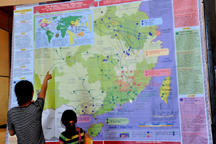 lived in places all over the world. They have contributed significantly to the well being of China, bringing in materials, ideas, money, and love to enrich Chinese life and culture.
lived in places all over the world. They have contributed significantly to the well being of China, bringing in materials, ideas, money, and love to enrich Chinese life and culture.
Han Suyin was asked a few years ago about her racial belonging. She answered,
“I have no use for race issues or racism. I am a Eurasian with a Hakka father and a Belgian mother. I am now a world citizen residing in Switzerland, and my roots are in China.”
Now, let us deal with WHEN, WHERE and WHY.
We go to the Song Dynasty of 960-1279 A.D.
History is not made in one day but in decades and centuries. So the time is about the year 1000 for easy memory, when Song was divided into Northern Song and Southern Song, when parts of China were ruled by the Leo, Western Hsia, and Jin.
It is interesting to note that the Song Emperors were excellent poets, a trait that most Hakka’s have in them. (See the couplets in every wall of Hakka dwellings.)
The Song Dynasty is one of the three greatest Dynasties in history. It was open and free, and therefore creative. Education was at a high level. Three of the four great inventions in Chinese history emerged during this time. We also talk about the Tang and Song poems being the most expressive and aesthetically beautiful in history. It was also a time of busy international traffic and trade, bringing people and materials together from diverse regions and cultures.
The term Hakka first appeared at this time in Southern China, when it was filled with a large number of retreating royalties and enterprising people freeing the north. They carried their wealth, culture, wisdom, language, and ancestor bones with them. They found that the south was a much better place than the north and decided to settle down, giving their best to develop it into a fine country. However, the local indigenous people felt differently, with mix feelings. They hated the visitors who were settling in. They also admired their culture, wisdom and poetry. In the struggle the visitors were called Hakka’s meaning guest family or resident. While the locals hurried to establish for themselves what was called 主户, meaning main residents in order to claim supremacy and legitimacy.
In time, however, the main residents began to learn the culture of the guest residents. They did so to ascend to nobility and spiritual respect. Not too few of them even changed their names to acquire guest resident identity.
It meant more mixing.
Thus, the term Hakka was established. It lasts until today.
I bet if I now ask you who are Hakka’s? You will give me a good answer. Your answer will be derived by you from what I’ve said this morning. It will NOT, NOT, NOT be the academic answer you used to have in your head from reading.
Theories abound why Hakka’s have stayed as a group through good times and bad; and for what good or gain?
One says they are forced to do so, to be safe in defense from the other groups; thus the tolous. Yes and no, and you have a better answer.
One says they are truthful to their ancestors.
One says they are proud and selfish.
One says they are adventurers and greedy people.
One says they are an inclusive who never marries other groups.
And there are more.
Use your mind and you will see these theories run thin.
The ANSWER is that the Hakka spirit is a time-tested spirit, central to the essence of the Chinese culture. It is a practicable spirit combining the wisdom of Confucius, Laoze and Zen.
So, would you discard such a spirit and adopt more fancy ones? The facts of world history show that, wherever the Hakka’s settle, they help their adopted environment to grow in many significant ways. Most of you know this from your own experience.
There are books exalting the Hakka great men and women, from revolutionaries, politicians to moving stars. The authors believe they fortify the Hakka value in doing so. Laugh at them when you see one next.
It should be recognized that the Hakka spirit nurtures people to be feeling, loving and authentic persons. Hakka’s fight for cause and not power, for love rather than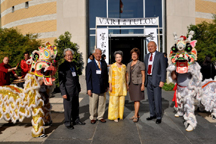 hate, for harmony rather then confrontation, for freedom rather than control, for prosperity rather than stagnation, for happiness rather than struggle. They remain humble and serene all the while as they make their best effort. Hakka’s are brave but gentle.
hate, for harmony rather then confrontation, for freedom rather than control, for prosperity rather than stagnation, for happiness rather than struggle. They remain humble and serene all the while as they make their best effort. Hakka’s are brave but gentle.
Nineteenth century Jesuits have studied Hakka as a social force for progressive development. By mid Twentieth Century, scholars and economists had noted the contributions Hakka’s and/or the Hakka spirit made to create the Four Dragons of Asia. The recent open and development policy, which have changed China, was initiated and implemented by Hakka’s, beginning in Hakka territories. But none of the heroes wanted to be a ruler. They are content, satisfied in having a job done well.
I said earlier that all of you have your history. You are leaders in your own right. You are Hakka in spirit and practice.
Was Confucius a Hakka? He was certainly a Hakka ancestor.
Was the great poet and literary giant Su Dong Po a Hakka? He was, and his great grandfather’s village is 15 km out of Huizhou.
Will Hakka continue to last? I say yes definitely. It has continued for centuries through so much challenge and change, in war and in peace, in China and around the globe. No other human spirit can be more viable.
I had this great experience of speaking to a group of high school students from Taiwan, Hong Kong and Huizhou at their annual summer camp last week. They come from Hakka parents. But not too many can speak or even understand the Hakka language. I spoke to them in Mandarin. In just one minute someone requested that I spoke Hakka. I did so. I counted about 30 applauses in a speech of 15 minutes. In the end, I asked why it was so enjoyable. They said: “Hakka sounds so beautiful”.
My topic on that occasion was Chinese food culture.
Food culture is not just food. It is food grown, understood, handled, cooked, and enjoyed in culture. In that respect, Chinese food is mostly Hakka.
From the beginning of times, the world creator, Peng Koo 盤古who lived to 800 years, had created the Chinese food, cooked with a number of grains and vege and meat into a gruel. This cooking and food had become the philosophical foundation of 和 (harmony), the most important wisdom for humanity.
The chopstick was created because one could not use hands to pick up boiling hot food and put into the mouth, and because bamboo was so readily available.
The Hakka virtue of frugality is seen in Chinese food, because we cut raw materials into small pieces, instead of cooking them in large steaks or roasts. You will find that a two-ounce piece of beef, finely cut, would make up a good compound dish. But, it would look menial in the form of a steak.
I have a book on Hakka Food Culture Around the World waiting to be published soon. It has in it 121 Hakka dishes cooked and enjoyed in culture. It also tells you how the wok and spatula were perfect technology, requiring no change, and facilitating the art of cooking in infinite variety to bring out the best in food. Every dish has one or more poems to make it meaningful and enjoyable.
I must obey my chairman to stop right away.
Ladies and gentlemen, I must thank you for being such an attentive and enjoying audience. Your laughs and applauses have inspired me to say what I said.
Thank you.


